

This is my seventh annual address to this noble institution.
Soon to become a book!
I discussed why Facebook (and other websites with user-contributed content) are bad for the web.
I introduced RDFa as a new technology for making web pages machine-readable, and how that could be used to create a social web.
I discussed how and why new technologies cause the death of incumbent companies.
I asked "Is Linux a Disruptive Technology?" and quoted "Linux will outship Windows on new PCs in 2009". That was before Microsoft created the cheap Windows 7 Starter, which delayed the rise of Linux.
About half of current computing devices now use Linux (and that's not counting wireless routers, satnav, internet radios...).
I noted that each time computer prices dropped by a factor of ten, you got a new class of computers that got used in a different way.
1M: Mainframe
100K: Minicomputer
10K: Workstation
1K: PC
and that netbooks and tablets are the €100 computer, and I predicted the coming of a €10 computer.
Since then the first €10 computer, the Raspberry Pi arrived, which has about the same power as a €100 computer from 6 years earlier, or a €1000 computer from 10 years earlier.
Now we should be watching for the €1 computer.
DNA is a sort of memory → Evolution of true memory→ Language, passes memories → Writing records memories that outlive you.
There are objective realities, and subjective realities. I talked about the physical, psychological and social aspects of colour perception as a subjective reality, and how they relate to the objective reality of frequencies of light.
I compared the introduction of the internet with the introduction of the printing press, and pointed out the parallels, pointed out that were some ongoing processes, and where that may lead.
Before the internet, the cost of making a telephone call depended on the distance you were calling.
A local call was cheap (only one tick regardless of length in NL until the introduction of Bulletin Boards).
Outside the local area, calls were more expensive, and outside that, international calls, were even more expensive, largely getting more expensive, the further away you phoned.
For instance, mid-80's, a call to the USA from the Netherlands would cost more than 4 guilders per minute, about €2 per minute (now 3 or 4 cents per minute from a 'landline').
The internet was set up as a sort of cooperative project.
If you wanted to connect to the internet, you had to find someone nearby, and connect to them; you only had to pay for your local connection costs.
When the Netherlands joined the internet (25 years ago!) we paid for an open telephone line (64kbps!) to the USA, which must have cost more than €1M per year!
You should know Moore's Law, which says that circuits get twice as dense every 18 months at the same cost.
Well, bandwidth doubles in speed at constant price PER YEAR! Consequently, we should expect that Amsterdam is now connected at around a speed of 64kbps × 225 which equals 2Tbps. Here is the bandwidth used last week:
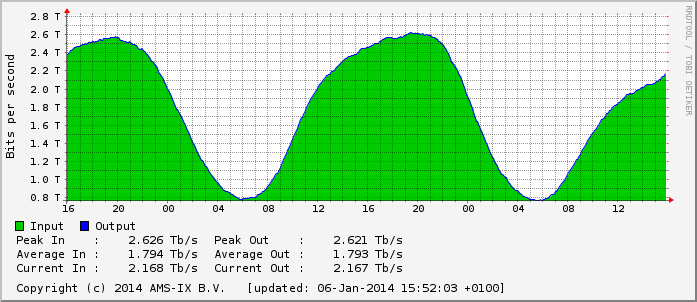
The first thing I did when the internet was connected in 1988 was ftp to a site in New York, just to check it was working (it was, you'll be pleased to hear).
But the interesting thing was: it didn't cost me any more to connect to New York than it did to connect to Amsterdam.
What this showed was that communication costs shouldn't be charged based on distance.
Of course there are expensive cables (and satellites) between Europe and North America, but these are one-time costs. Once they are running, the costs are amortised over of thousands of simultaneous calls.
The really expensive part of the connection is your individual link to the telephone exchange, which only you use.
Once the internet got fast enough (doubling per year), it started being possible to do voice calls over the internet. Skype wasn't the first, but it is probably the most used now.
Essentially, phone calls have become free with the right infrastructure.
Luckily, the internet isn't owned by anyone, so the telephone companies have had to sit by and watch their golden goose be slaughtered, and have been unable to do anything about it...
There's no one to sue!
For the telephone companies, the internet has been a disruptive innovation (a subject that I gave a full talk on earlier in this series).
2009 was the 400th anniversary of an Englishman, Henry Hudson, working for a Dutch company, discovering the island of Manhattan. Then, and for centuries after, all trans-Atlantic shipping was done with sailing ships.

When steam ships were introduced they were not reliable enough to travel trans-Atlantic distances, they couldn't travel far without breaking down, and they were inclined to blow up.
 The Fighting Temeraire tugged to her last Berth to be
broken up, by Turner, 1838
The Fighting Temeraire tugged to her last Berth to be
broken up, by Turner, 1838
But steam ships were able to find a niche in lake and river transport, where the distances were short, and where they had the advantage of being able to travel against the wind and on wind-still days.
Once in the niche they could improve reliability until they were able to travel trans-Atlantic.
Once that happened, all shipping switched to steam, and all the companies producing trans-Atlantic sailing ships went out of business; not one survived into the 20th century.
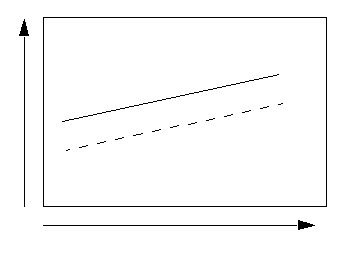 Typically, technologies improve gradually and continually over time. These are
sustaining improvements. An existing technology fulfils or exceeds the
market's needs.
Typically, technologies improve gradually and continually over time. These are
sustaining improvements. An existing technology fulfils or exceeds the
market's needs.
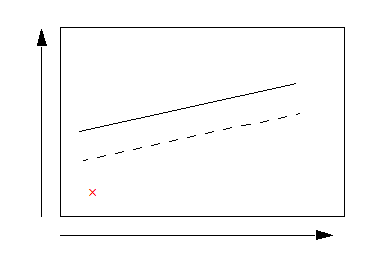 Steam ships on the other hand are an example of a disruptive
technology, a term introduced in the excellent book The Innovator's
Dilemma by Clayton M. Christensen.
Steam ships on the other hand are an example of a disruptive
technology, a term introduced in the excellent book The Innovator's
Dilemma by Clayton M. Christensen.
A disruptive technology when introduced is able to do similar things as an existing technology, but has one or more disadvantages that make it less desirable for the existing market, such as higher price, lower performance, lower reliability etc.
If that were all, then of course no one would buy it, but a disruptive technology always has at least one advantage over existing technologies that despite its disadvantages allows it to find a niche.
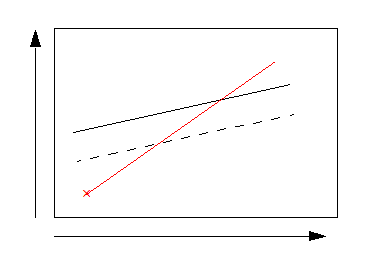 Whilst in this niche it is able to improve, typically more rapidly than the
existing technology, until it performs equally with the existing technology, or
at least sufficiently for the market needs, but with the added advantages that
it had that allowed it to survive.
Whilst in this niche it is able to improve, typically more rapidly than the
existing technology, until it performs equally with the existing technology, or
at least sufficiently for the market needs, but with the added advantages that
it had that allowed it to survive.
As a result the existing market steps over to the new technology and the old one dies (typically taking the companies producing the technology with it).
It is difficult to believe that the change from 8 inch to 5¼ inch disk was a disruptive innovation, but they represented different technologies. Compare the two when 5¼ inch disks were introduced in 1981:
| 8 inch | 5¼ inch | |
|---|---|---|
| Capacity | 60 MB | 10 MB |
| Volume | 10 litre | 2.5 litre |
| Weight | 10 kg | 2.75 kg |
| Access time | 30 µs | 160 µs |
| Cost | $3000 | $2000 |
| Cost per Mbyte | $50 | $200 |
When a disruptive technology is first introduced, it looks pathetic to the existing market. "Why would anyone want that?"
Disruptive technologies are almost never introduced by an existing company; in the few cases that an existing company has seen the risk, and been successful, it has been by spinning off a new company or division (or buying one in).
Reminds me of: "First they ignore you, then they ridicule you, then they fight you, then you win." (Attributed to Gandhi - on a completely different subject)
There are plenty of disruptive technologies visible that have taken over:
These aren't cases of bad management by the old tech firms. They were inevitable changes. The only response that an existing company can make is to get out of the old tech.
I'm going to talk about three types of content
Pre-internet, in order to provide content to the world you needed to
and these all demand an expensive infrastructure.
An author could try to do this all, but that would interfere with the time available to create stuff.
And that's why we have publishers: to provide an infrastructure.
So the author creates the work, and the publishers take it and supply it to the world.
Most creators get almost nothing for this. A typical book contract gives an author 10%.
The average book nets an author €3000.
According to Courtney Love does the math, a $1M advance on an album gives band members each $45k to live on for a year, and they make nothing after that on the album, whereas the record company nets $6.6M. "The system's set up so almost nobody gets paid."
Academic publishing is even worse:
No one gets paid for the content except for the publishers.
But we guarantee quality! claim the publishers. We select the good works, and make sure they get published.
Zen and the Art of Motorcycle Maintenance by Richard Pirsig, which was a bestseller as soon as it came out, was rejected by 121 publishers before it was accepted!
Doris Lessing was a best-selling author. In 1984 she decided to write a book under a pseudonym. The Diary of a Good Neighbour by Jane Somers was subsequently offered to Lessing's two main publishers (without telling them who had really written it, of course). They both turned the book down.
And of course the Beatles got turned down too. "We've already got a Liverpool Band".
Existing players don't like new technologies.
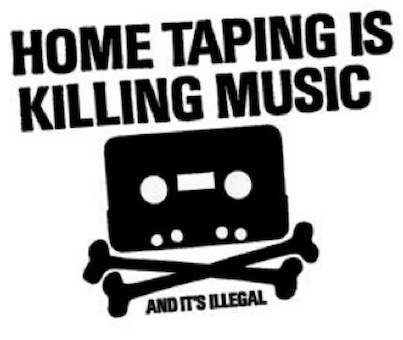 When
cassette recorders were introduced, the record industry waged a huge
campaign against them 'killing
music'.
When
cassette recorders were introduced, the record industry waged a huge
campaign against them 'killing
music'. Badly.
By taking 12 year-old girls to court, for instance.
And by shutting down Napster, which was a big mistake.
Why was it a mistake? People wanted the service. The industry should want people to copy.
Let me explain.
Academic journals are very expensive.
When journals increase their prices by 10% in a year (as does happen), my library decreases its holding by 10%.
Does that mean I can't read them? No, because of the academic version of Napster: the interlibrary loan
What happens is that my library finds out which library has the journal I want, and contacts them.
That library then photocopies the article I want to read, and sends it to my library.
How can this happen? Journal acquisition and copying come from different budgets.
So the people who benefit are the copier manufacturers and so on. Not the journals.
Similarly in the past with cassette recorders. People who copied music still paid, but the money went to the cassette manufacturers.
So people are willing to pay some amount of money for these things they are copying, just not the prices that the full-price object requires.
People only have a certain amount of disposable money, that they have to spread over all sorts of purchases.
It is quite possible (and there is research to support) that most copying is for things that the copiers wouldn't have bought anyway, or are copying to see if they want to buy it.
There are many pieces of research that say that the people who copy the most are exactly the people who buy the most. (Note: this is a correlation, not cause-effect!).
Encourage copying! But make sure that the money that would otherwise go to other people goes to them!
This also frees up all the money that they had been paying on policing, which is just lost profit.
By destroying Napster et al. the record industry handed that extra money over to Steve Jobs and iTunes. The fools!
Apart from the poor unfortunate record companies, record shops have suffered too from the internet.
But I think it is for a different reason than most people think.
Have you ever gone into a supermarket with the intention of just buying a single thing, bread, or bananas, or milk, or something, and emerged with a carrier bag bursting at the seams and straining at the handles? I expect so. I certainly have many times.
Supermarkets know very well that the important thing is to get you in to the store in the first place. Since most supermarkets are perfectly interchangable with each other, they know that once you're in, the battle is mostly won.
They design their supermarkets around this idea (it is usually difficult to get to the cash desks without passing through the whole shop, for instance).
Supermarkets often have what they call "loss leaders". They offer some popular good at a price that actually loses them money. That gets you into the shop, and then you spend all that money on other things as well.
However, sometimes we are not even aware of the real transactions going on.
For example, an uncle of mine used to run a newspaper shop. He told me: "I make no money on newspapers. All my income comes from Mars Bars. I actually run a Mars Bar shop, but the newspapers are to get people to come into the shop in the first place."
And that got me thinking. What got people into record shops wasn't records but information.
As a teenager, I used to go and hang out in the record shop nearly every day, just to see what was new, not with the intention to buy, but accumulating what I might buy should I have enough money.
As Marshall McLuhan said in 1964: "The classified ads (and stock market quotations) are the bedrock of the press. Should an alternative form of easy access to such diverse daily information be found, the press will fold." (Understanding Media).
Similarly, like newspapers and Mars Bars, it was Information that got people into record shops. Once people could find an alternative and easier source of the information they were less likely to go into the shops, and therefore, less likely to buy.
This probably, by the way, also explains the demise of Top of the Pops in the UK as well.
The first legal introduction of copyright was in 1709 in the UK.
It allowed 14 years of copyright protection for authors, with one allowable extension of 14 years if the author was still alive, and asked for the extension.
The idea was to protect authors, while still protecting the public.
The publishers were very upset by this. They had wanted perpetual copyright, and argued:
"without it scholarship would cease to exist and that authors would have no incentive to continue creating works of enduring value if they could not inherit the property rights to their descendants."
(Note that this was 100 years after the death of Shakespeare, who apparently had incentive enough to create works of enduring value)
And it's easy to see that publishers are still trying to work towards that perpetual copyright!
In the USA before 1976, copyright was 28+28 years.
In 1976 it was extended to the lifetime of the author, plus 50 years.
Then in 1998 it was extended to the lifetime of the author, plus 70 years.
Maybe they are working towards perpetual copyright, twenty years at a time. It will be interesting to watch what happens in 2018...
Sound recordings were not protected by copyright (still using the USA here) at all until 1972.
There were no home recording devices available until the late 50's (reel-to-reel) and early 60's (cassettes).
It was only in 1961 that suggestions were raised that sound recordings should also be copyrightable.
The US constitution actually prevents having a perpetual copyright. Article I, Section 8, Clause 8 empowers the United States Congress:
To promote the Progress of Science and useful Arts, by securing for limited Times to Authors and Inventors the exclusive Right to their respective Writings and Discoveries.
The then-head of the MPAA Jack Valenti proposed that copyright last forever less one day. Good to see them being so honest.
Often as a creator, you are required to hand the copyright over to the publisher. This happens often with recording artists. However, in this case after 35 years you can claim it back.
Some sorts of content, such as text books, and text you write as part of your employment are classified as "works for hire" and have different copyright provisions; usually the employer owns the copyright and gets to keep it for 120 years.
In 1999, the RIAA sneakily inserted a technical amendment into this act that defined sound recordings from musical artists as works for hire from the recording studios.
In other words, musicians could no longer hold the copyright to their works ever.
(A repeal of this law came into effect in 2013)
The infrastructure is no longer expensive. Everyone has it at home! There is an audience of billions! We don't need printing presses, and distribution networks any more. Publishers are finished; the internet is their disruptive technology.
The only part that is not accounted for is bringing work to the attention of others.
And that's one of the roles social networks play. Gangnam Style didn't get 2000 Million views because it got advertised somewhere!
That's largely how academic articles get passed around: by recommendation/citation.
Let me just say that my first book got bought by a few thousand people. I made a little money with it, but not much.
Since it went out of print though, I have scanned and OCR'd it, (I made sure my contract returned the copyright to me once it went out of print) and put it on the internet (for free), where it has been downloaded hundreds of thousands of times. Did I write that book in order to make money, or in order to be read? Definitely the latter.
Content is currently far too expensive.
90% of the price is only there for supporting an unnecessary and inefficient infrastructure.
As new mechanisms come into force, content will become cheaper, and yet authors will receive more of the money.